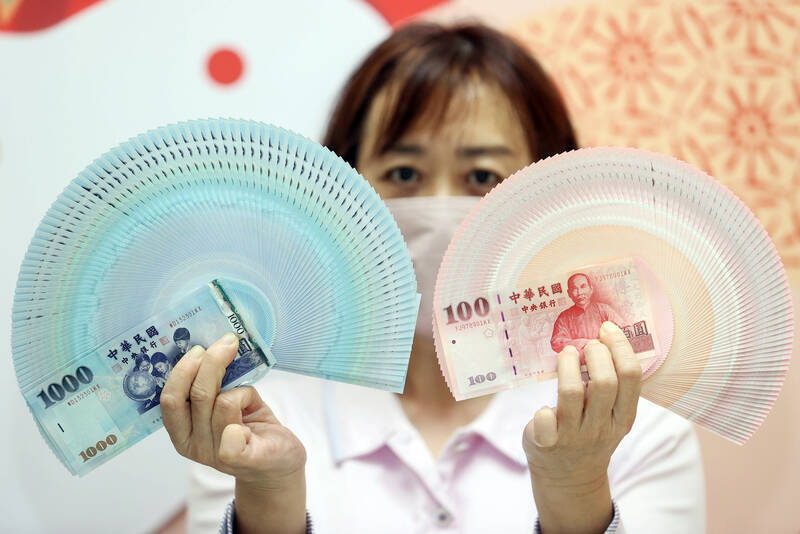The nation’s money supply last month rose slightly, as demand and time deposits increased, even though foreign investors cut their holdings and wired money abroad, the central bank said yesterday.
The narrow M1B money supply gauge grew 2.68 percent from a year earlier, while the M2 broad supply reading rose 6.7 percent, the central bank said.
The pickup in M1B — referring to cash, demand deposits and other liquid deposits — had to do with the government’s distribution of a NT$6,000 (US$195) tax rebate, which mostly went to people’s demand deposit accounts, the central bank said.

Photo: CNA
The M1 measure was also supported by increasing securities accounts, whose balance grew by NT$47.8 billion to NT$3.19 trillion by the end of last month, the central bank said.
The rise in securities accounts came even though foreign portfolio managers cut their positions in local shares by NT$78 billion and wired capital and profit abroad, sinking their savings deposits to a two-year low of NT$196.9 billion, the central bank said.
CAPITAL FLIGHT
The capital flight dragged the benchmark TAIEX by 1.8 percent after Taiwan Semiconductor Manufacturing Co (台積電) gave a conservative business guidance for this quarter and lowered its revenue forecast for this year.
The sole chip supplier for Apple Inc’s iPhone series also said that inventory adjustments by major customers would stretch into the third quarter, dashing hopes of a quick recovery.
The M2 measure, which encompasses time deposits, time saving deposits, foreign currency deposits, mutual funds and M1B, registered a double-digit percentage increase in time deposits encouraged by interest rate hikes, the central bank said.
It dismissed concerns that the rapid increase in time deposits would deny the local bourse liquidity and growth momentum, saying that the market remains active in light of improving daily turnover.

Nvidia Corp CEO Jensen Huang (黃仁勳) today announced that his company has selected "Beitou Shilin" in Taipei for its new Taiwan office, called Nvidia Constellation, putting an end to months of speculation. Industry sources have said that the tech giant has been eyeing the Beitou Shilin Science Park as the site of its new overseas headquarters, and speculated that the new headquarters would be built on two plots of land designated as "T17" and "T18," which span 3.89 hectares in the park. "I think it's time for us to reveal one of the largest products we've ever built," Huang said near the

China yesterday announced anti-dumping duties as high as 74.9 percent on imports of polyoxymethylene (POM) copolymers, a type of engineering plastic, from Taiwan, the US, the EU and Japan. The Chinese Ministry of Commerce’s findings conclude a probe launched in May last year, shortly after the US sharply increased tariffs on Chinese electric vehicles, computer chips and other imports. POM copolymers can partially replace metals such as copper and zinc, and have various applications, including in auto parts, electronics and medical equipment, the Chinese ministry has said. In January, it said initial investigations had determined that dumping was taking place, and implemented preliminary

Intel Corp yesterday reinforced its determination to strengthen its partnerships with Taiwan’s ecosystem partners including original-electronic-manufacturing (OEM) companies such as Hon Hai Precision Industry Co (鴻海精密) and chipmaker United Microelectronics Corp (UMC, 聯電). “Tonight marks a new beginning. We renew our new partnership with Taiwan ecosystem,” Intel new chief executive officer Tan Lip-bu (陳立武) said at a dinner with representatives from the company’s local partners, celebrating the 40th anniversary of the US chip giant’s presence in Taiwan. Tan took the reins at Intel six weeks ago aiming to reform the chipmaker and revive its past glory. This is the first time Tan

CUSTOMERS’ BURDEN: TSMC already has operations in the US and is a foundry, so any tariff increase would mostly affect US customers, not the company, the minister said Taiwanese manufacturers are “not afraid” of US tariffs, but are concerned about being affected more heavily than regional economic competitors Japan and South Korea, Minister of Economic Affairs J.W. Kuo (郭智輝) said. “Taiwan has many advantages that other countries do not have, the most notable of which is its semiconductor ecosystem,” Kuo said. The US “must rely on Taiwan” to boost its microchip manufacturing capacities, Kuo said in an interview ahead of his one-year anniversary in office tomorrow. Taiwan has submitted a position paper under Section 232 of the US Trade Expansion Act to explain the “complementary relationship” between Taiwan and the US